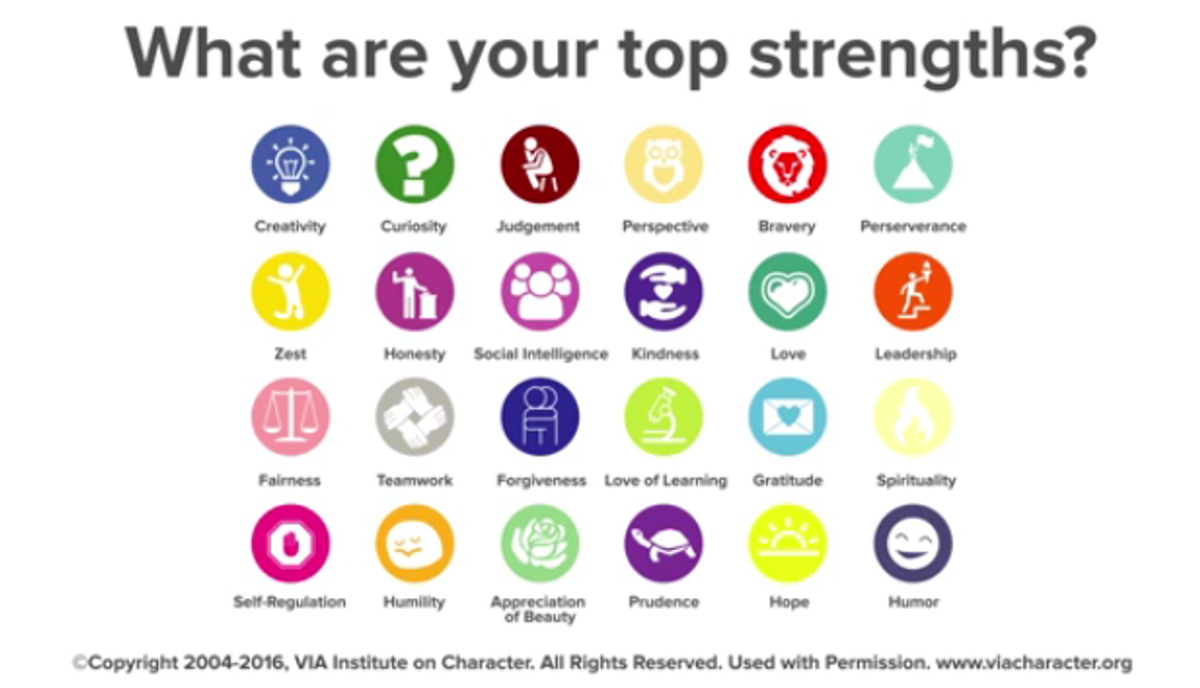Parent Page

Character Strengths
A young couple became new parents to an energetic and delightful little boy. They worked hard to not take their parenting for granted, learning from their mistakes and trying to strike a balance between offering guidance/direction and allowing their son to explore and express himself. One day, when their son was just over two-years-old, he got a hold of some permanent markers that were sitting at the edge of a table. With lightning quickness, the boy scurried over to a freshly painted wall and began to use the wall as his canvas. He scribbled and scribbled with purpose and intensity. When he was done he threw the markers down and walked away.
When the parents came upon the wall, they were stunned. Giving pause, they looked at each other for a moment. They knew just what to do. They went to the store and purchased a picture frame. They pounded the frame into the wall, three-feet from the floor, “framing in” the entire set of scribbles created by their son.
Instead of yelling at their son, they transformed it into a work of art.
(from Mindfulness and Character Strengths, p. 191).
These parents decided not to take away what was already present but instead to work with it and use it for a positive end. This is at the heart of the first tool I’d like to share with you – positive reframing.
Positive Reframing
To reframe something is to offer a new perspective. To give yourself a different view of a situation. This is essential when taking an approach that embodies Mindful Strengths Parenting. When you are stressed in your parenting (which will happen a lot!), you can ask yourself: Is there another way I might look at this situation? How might I look at it through the lens of strengths? Sometimes reframing simply involves replacing one word in your thought process. Consider these examples, each of which uses the VIA Classification as the reframing system:
- Your “stubborn child” becomes your “perseverant child.”
- Your “distractible son” becomes your “highly curious son.”
- Your “wild and hyperactive daughter” becomes your “zestful daughter.”
- Your “clingy, dependent son” becomes “your warm and loving son.”
- Your “slowly progressing daughter” becomes “your prudent and cautious daughter.”
Get the idea? Pick any behavior you are witnessing in your child – or any issue or struggle you are having with them. This is the easy part because it has probably occupied your worry, frustration, and struggles. Then, put on a pair of strengths glasses to give you a fresh look at the situation. What character strengths is your child using (albeit imperfectly)? When we get upset or anxious, our attention narrows and we therefore miss a substantial portion of reality. What is the “strengths reality” you have been missing?
Note that I’m not offering a replacement for a diagnosis here, nor am I suggesting that you never use the negative-oriented words. Instead I’m encouraging a more balanced approach to parenting – one that does not fall into a deficit-only, problem-focused approach.
From Mindset to Mindful Speech
Your reframing can move beyond this mental approach to something that you share aloud with others. When reframing is offered as verbal feedback to someone, this gives the person an empowering insight into themselves, and it presents them encouragement they can take to handle their issue.
This can be a powerful alternative to the “culture of no” operating in our families. If you were to get a transcript of your parenting lingo throughout a given week, you might be surprised to learn that your language is filled with multiple versions of “no.” For example, you’ll hear yourself say: “Don’t do that!” “No, you can’t,” “That’s not a good idea,” and “You shouldn’t be over there.”
What would it be like to add more “yes” responses in your parenting? Don’t condone inappropriate or dangerous behavior. Instead, observe yourself and see if you sometimes go too far with your “no” responses.
You just might find yourself saying some new words to your child.
Summary
Here are a few takeaway tips:
- Consider how you react when your child does something you don’t like. Bring mindful awareness to your thoughts, feelings, and actions.
- When you get upset with your child for their behavior, pause and consider a positive reframe. What character strengths might they be using?
- Be mindful of whether or not you are perpetrating a “culture of no” in your family.
March 23, 2018 by Dr. Ryan Niemiec ·
Resources
Niemiec, R. M. (2014). Mindfulness and character strengths: A practical guide to flourishing. Boston, MA: Hogrefe.
Niemiec, R. M. (2018). Character strengths interventions: A field-guide for practitioners. Boston, MA: Hogrefe.

